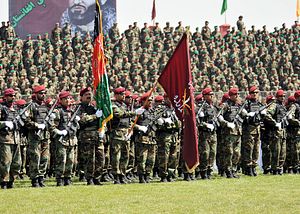When Hamid Karzai sat in Afghanistan’s presidential palace, he often treated Pakistan with outright contempt. Karzai repeatedly turned down offers to train Afghan National Security Forces (ANSF) at the Pakistani Military Academy in Abbottabad, sending elite recruits to train in India. By the time Karzai left office last August, he’d accepted $2 billion in weapons from India. There seemed to be very little doubt over who had become Kabul’s patron.
Just seven months later, the tide has shifted. In February, newly-elected President Ashraf Ghani agreed to send six elite Afghan troops to an eighteen-month course in Abbottabad. It’s largely a symbolic move: these six troops are just a handful in a force expected to grow to 352,000 strong by the beginning of 2017.
But as a diplomatic measure, the move bears significant weight. Visiting Islamabad in November, Ghani emphasized the need to “open a new chapter” in the relationship, describing plans to deny access to anti-Pakistani militants in the mountainous country, particularly in the embattled border region to the East. That will not be an easy task, but they’ll have some assistance: in February, a five-member delegation of ANSF leaders visited Islamabad to talk security with their counterparts in Pakistan’s Army. They might want to take that advice with a grain of salt: Pakistan has been fighting its own insurgency for the past 14 years, and has gained little ground.
For Ghani, why take the risk? Afghan officials in the past have expressed fears that Pakistan has taken the liberty of spying on them, and Islamabad’s approval among most working-age citizens remains perilously low. Some military officials, like General Atiqullah Amarkhail, former commander of Afghanistan’s Air Force, are also expressing displeasure. “It is a bad idea to send officers to Pakistan for military trainings,” Amarkhail told Deutsche Welle in February, fearing the move could upset India, Kabul’s former patron. Adding to those fears was Ghani’s decision to suspend for Indian heavy weapons, originally made at the behest of his predecessor. The Diplomat’s Ankit Panda thought the move signaled a growing courtship of Islamabad by the new president, but stopped short of chalking up the broken deal to any sort of regional realignment.
That would be tough to imagine. Pakistan is not in a position to give Afghanistan the type of aid that India can offer. For Ghani, tempering, rather than inflaming Pakistan, which can cause serious damage by stoking insurgency in Pashtun-dominated provinces, is probably the right long-term move, even if he risks upsetting Modi today. Perilous regions invite perilous politics. Sending its troops to train in Pakistan is a sign that Afghanistan is learning to play that dangerous game.

































